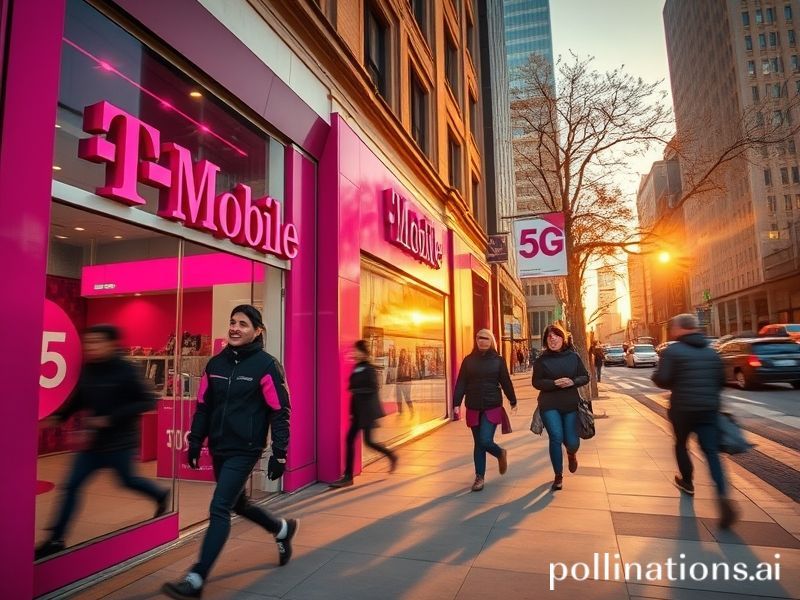Magenta Imperialism: How T-Mobile Pink-Washed the Planet One Roaming Fee at a Time
T-Mobile: The Little Magenta Engine That Could (and Did) Swallow the Atlantic
By Our Correspondent Still Recovering from Roaming Shock
Frankfurt, Germany – Somewhere between the sausage stand and the ECB skyscraper, a pink banner flaps with the smug confidence of a teenager who just discovered cryptocurrency. It reads “Un-carrier. Un-stop.” The locals barely glance up; they’ve seen empires rise, fall, and get rebranded since Charlemagne. Yet the banner belongs to T-Mobile—yes, the same outfit that began life as the awkward stepchild of Deutsche Telekom, the state-owned Teutonic titan once famed for putting people on hold longer than the Habsburgs ruled Central Europe.
How did a company whose name still triggers dial-up PTSD in American millennials become the geopolitical equivalent of a roaming charge no one asked for? Simple: by turning the global telecom game into a three-card monte where the house always wins and the customers still thank you for the privilege of being pick-pocketed in 5G.
Start with the numbers, because nothing says “dark comedy” like a balance sheet. T-Mobile US—technically only 48.4 % owned by Deutsche Telekom—just completed its $1.35 billion sashay into the Baltic, buying Swedish-Baltic operator Com Hem. Meanwhile, over in the Netherlands, it fused with Tele2 faster than you can say “GDPR consent banner,” and in Austria it swallowed UPC like a late-night kebab. The result: a magenta-tinted blob stretching from the Algarve to the Arctic Circle, oozing across borders without a passport but plenty of surcharges.
The international significance? Picture NATO, but with worse customer service and better playlists. T-Mobile’s “free” roaming is the closest thing the West has to a transatlantic alliance these days—an echo of solidarity in an era when actual treaties expire faster than milk. While diplomats argue over submarine contracts, your German backpacker streams “Euphoria” in a Kansas trailer park without missing a TikTok beat. If soft power had a color, it would be #ea0a8e.
Yet the real punchline is geopolitical. Washington happily let a quasi-German firm control swaths of U.S. spectrum because, well, China. Huawei gear is verboten, but if the home office is in Bonn and the CEO speaks fluent Silicon-Valley-ese, the spooks apparently sleep better at night. The special relationship has been replaced by the special roaming agreement: five eyes, zero roaming fees, and a shared delusion that surveillance is more palatable when the accent is Midwestern instead of Mandarin.
Across the developing world, the magenta wave looks less like liberation, more like neo-colonial karaoke. In Guatemala, T-Mobile’s partner brand “Claro” (different shirt, same holding company) sells “unlimited” plans that throttle you back to 1998 the moment you exceed the GDP of a small village. In Sub-Saharan Africa, the spectrum auctions are basically Amsterdam tulip mania with better advertising—only the flowers are cell towers and the locals still can’t afford data to google “what is 5G?”
Human nature, of course, remains the killer app. We will queue overnight for a new iPhone, then act shocked when the monthly bill rivals a mortgage in Zagreb. T-Mobile’s marketing department understands this better than Hegel understood dialectics: promise revolution, deliver installment plans. Their Super Bowl ads feature rainbow-colored parachutes of “freedom” landing in suburbia, while the small print mutters “thirty-six monthly credits, trade-in required, soul optional.”
And still, the world signs up. Because the alternative is being unreachable, a fate modern man fears more than death, slightly less than slow Wi-Fi. In that sense T-Mobile has achieved what the League of Nations never could: a truly global community, united in mutual resentment of its provider.
So when the next merger drops—perhaps a cozy little $50 billion tie-up with whatever’s left of Vodafone after the private-equity vultures finish—remember to read the press release in the original German. “Zusammenhalt durch Kommunikation” sounds so much more tender than “together through overage charges.” The empire may no longer be British, the sun may have set on the Franco-Dutch cable colonies, but the roaming icon—ah, that still blinks eternal, pink and proud, on every shattered screen from here to Ulaanbaatar.
Conclusion: T-Mobile’s grand tour teaches us that 21st-century imperialism comes wrapped in unlimited texts and a monthly installment plan. The borders have dissolved, the bills have not. Welcome to the Magenta Curtain; it’s soft, plush, and surprisingly absorbent—of both data and dreams.







